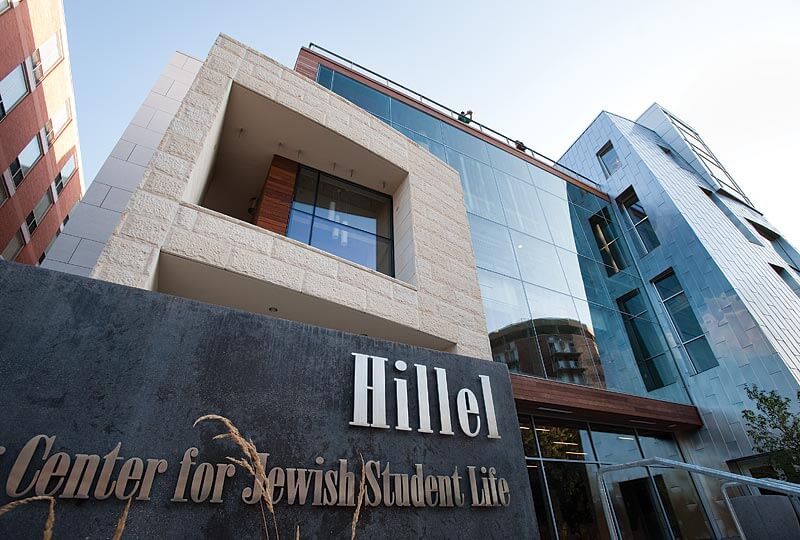Hillel building at the University of Wisconsin in Madison.
In recent years, we have seen Palestine activists protest Hillel groups on campus.
Pro-Israel organizations and pundits often insist that protesting the largest Jewish student organization somehow makes the Palestine movement antisemitic, but Hillel is not exactly apolitical.
In the mid-2000s, they embraced the slogan “Wherever we stand, we stand with Israel,” they sponsor the Birthright program, and they forbid campus Hillels from partnering with anti-Zionist groups.
Earlier this year, Yale Hillel hosted former Israeli solider and Prime Minister Naftali Bennett, which inevitably led to protest. At an event at Harvard Business School later he joked that he would give exploding pagers to protestors, alluding to the Israeli attack on Lebanon that killed dozens of people and injured thousands.
Here’s Andrew Getraer, executive director of Hillel at Rutgers, explaining the group’s mission at a Zionist conference in 2019:
We came up with this idea, we are driven by a core belief, that a positive relationship to Israel is essential for a healthy Jewish identity. It’s not about where you are on the political spectrum. It’s not about what party you would vote for or how much you hate Bibi. Which by the way, college students hate Bibi. My sons are in college too, and I’m going to tell you 80 percent of students think that Bibi is a terrible human being. I happen to be the only Likudnik in New Brunswick. So I’m not here to criticize Bibi…
We want to see past that aspect of political Zionism. We want students to have a positive relationship to the state of Israel, because if they don’t they’re not going to be healthy as Jews. People can’t be healthy if they don’t have a good relationship with their family. You can go through life hating your parents or your brother or your sister, but it’s going to be pain for you for the rest of your life. If you’re a Jew and you can’t find that positive relationship to your brothers and sisters in Israel, and the state of Israel, there’s going to be a part of you that’s in pain, even if you ‘re not aware of it, or you’ve rationalized it away, you’re not fully healthy.
In 2013, Swarthmore College’s campus Hillel became the first one to adopt an open policy” toward partnering with other groups. “All are welcome to walk through our doors and speak with our name and under our roof, be they Zionist, anti-Zionist, post-Zionist, or non-Zionist,” they declared.
This kind of tension was well-established before October 7, but the ensuing protests obviously added additional dimensions to the friction. Last month the New York Times ran a piece saying that the organization is “thriving,” but also “torn by conflict.”
The article cites a very important statistic that I’ve referenced in this newsletter before:
The current ideological split feels sharper, as campus protests for and against Israel have led to arrests, suspensions and lawsuits. When it comes to the campus Hillel, “a lot of students don’t feel comfortable going in for political reasons,” said Danya Dubrow-Compaine, a senior and a co-founder of Yale Jews for Ceasefire.
There is also a growing generation gap. In a Pew survey conducted in February 2024, 38 percent of adults under 30 years old said Israel’s reasons for fighting Hamas were valid, down from 41 percent two years earlier. That compares with 78 percent of people 65 and older who said the same, up several points from the earlier survey.
Elijah Bacal, a sophomore who is an organizer for Yale Jews for Ceasefire, said the institutional leadership of the Slifka Center, as Yale’s Hillel is known, has been slow to adapt.
“I think there is a real, honestly, just like an out-of-touchness,” Mr. Bacal said.
You might assume that a group like Hillel is cheering on Trump’s recent wave of student deportations, as it has been advocating for pro-Palestine speech to be repressed for years. Here’s part of a list compiled by Palestine Legal:
- Hillel International threw in its weight to condemn a course on Palestinian history at the University of California, Berkeley, joining complaints from other Israel advocacy organizations and Israeli government ministers, which resulted in the mid-semester suspension of the course, in flagrant violation of academic freedom. The university suspended the student-led course, called “Palestine: a Settler Colonial Analysis” and then reinstated it after an outcry from faculty, students and civil rights organizations who protested the First Amendment and academic freedom violations. The Palestinian-American student facilitator was subjected to a severe international smear campaign.
- In 2014, a representative of Hillel accused students at Barnard College who hung a banner showing the map of historic Palestine of making Jewish students unsafe. The banner was removed.
- In 2014, Hillel at Loyola University in Chicago accused Palestinian students of bias-motivated misconduct, harassment and bullying because they lined up at a Birthright Israel table and requested to register for the program, which excludes Palestinians. The Palestinian students were investigated and punished for their protest.
The group has also called for student activists to be criminally investigated. From the same list:
- In May 2016, after a multi-racial group of student protesters at University of California Irvine, held signs and chanted outside a Hillel-supported film screening, Hillel falsely accused the protesters of physically threatening Jewish students. The case was referred to the Orange County DA for criminal investigation, but no charges were filed when it became clear that there was no evidence. UC Irvine investigated and determined that while the protest was too loud, it did not target Jewish students, and was peaceful.
- In 2014 at Northeastern University, Hillel boasted that it worked closely with police to investigate students who distributed “mock eviction” notices in dorms to raise awareness about Israeli home demolition policies. Accusations that the flyers targeted Jewish students resulted in the suspension of Students for Justice in Palestine. The suspension was lifted after an outcry.
- In 2010 at University of California Irvine, after the “Irvine 11” verbally protested a talk by the Israeli Ambassador, the director of Hillel at UC Riverside met with the Orange County District Attorney (DA) before the DA filed criminal charges against the student protesters. The purpose of the meeting was presumably to encourage filing criminal charges, even though the protesters had already been punished by the school. This is the same DA who faced charges of prosecutorial misconduct during the trial. The case was widely viewed as a shocking attempt to criminalize peaceful political protest against Israel.
- In 2010, Hillel accused students at Rutgers of material support for terrorism when they fundraised for humanitarian aid to people in Gaza. As a result, the money could not be sent to the students’ selected humanitarian organization.
Despite all this, Hillel International CEO Adam Lehman put out a statement expressing some concerns about Trump’s crackdown.
Lehman begins his remarks by asserting that “Jewish students have been assaulted, harassed, intimidated, and demonized,” but he doesn’t necessarily believe Palestine protesters deserve to be snatched off the street and deported.
“For the benefit of Jewish students and all students, we believe it is essential that students, faculty, and staff violating laws and campus codes of conduct be held accountable for those destructive actions,” writes Lehman. “At the same time, we also believe that due process for those accused of wrongdoing is essential — whether through mandated protections in legal settings or consistent, fair, and responsive disciplinary procedures at the university level.”
Additionally, he’s worried that the Trump moves could actually increase antisemitism.
“We also share concerns over ways in which actions to combat campus antisemitism can inadvertently fuel further antisemitism, by feeding into longstanding tropes about outsized Jewish influence, and leading some people to unfairly hold Jewish students and faculty responsible for actions such as the withholding of significant research grants,” he writes.
For obvious reasons, it’s difficult to take Lehman’s tepid concerns seriously. For a more honest appraisal, let’s turn to Rabbi Jason Rubenstein, Executive Director of Harvard Hillel.
Rubenstein recently sent out an email praising Harvard President Alan Garber for seemingly deferring to Trump and moving to implement policies clearly designed to suppress pro-Palestine sentiment.
Rubenstein praises Garber for a number of recent anti-Palestine moves: severing ties with a West Bank university, enacting more restrictions for campus organizers, suspending the Palestine Solidarity Committee, suspending the Harvard Divinity School’s Religion, Conflict, and Peace Initiative, and dismissing the faculty leaders of the school’s Center for Middle Eastern Studies.
Rubenstein argues that all this great stuff should earn Garber the benefit of the doubt from the pro-Israel crowd.
“What stance carries weight, and with it risk? In this moment of turmoil, the answer is saying, to this entire community, something I tell individual alumni each week,” writes Rubenstein. “I am constantly asked, ‘Is Alan Garber the right person to lead Harvard right now?’ And the answer I always give is, “Yes.” Through hours of conversations, and exchanges the contents of which I cannot disclose, I have come to the same conclusion as many others throughout Harvard: that Alan carries love of Harvard and hatred for anti-Semitism in his heart; that he is a man of both calmness and conviction; and that his skill and courage should give us hope as he leads this deeply divided and irreplaceable university through this long crisis.”
“These are the relationships, and this is the type of community – one where we act together, not allowing our fears to isolate us and turn us against one another and defeat our collective search for truth and joy – that we are building with students at Hillel each Shabbat; and as we mend the rifts of this great, dispersed, community, that spans the world and contains within it infinite possibility,” he continues.
Last week Three Harvard students and two recent graduates had their student visas revoked by the Trump administration.
AIPAC targets Senators
Last week the Senate voted on a pair of resolutions that would have blocked an $8.56 billion sale of weapons and munitions to Israel.
That effort was led by Senator Bernie Sanders (I-VT), who introduced a similar set of resolutions last fall. Just 15 Senators backed the resolutions, less than the last time around.
Now the pro-Israel lobbying group AIPAC is targeting those Senators with a six-figure social media and television ad buy across 11 states.
“Bernie Sanders is jeopardizing the safety and security of the Jewish state as it fights a seven-front war against Iran and Iranian-backed terrorists,” says AIPAC spokesperson Marshall Wittman. “These ads will educate constituents of the senators who voted with Bernie Sanders to undermine America’s partnership with our democratic ally.”
This is a great example of how AIPAC exerts influence over U.S. politicians.
During the autumn vote, Sanders found support from Senator Jon Ossoff (D-GA). He gave an impassioned speech on the Senate floor, defending his decision.
He began by reminding his colleagues that Ronald Reagan had blocked cluster munitions to Israel over its brutal attacks on Lebanon in 1982.
“I tell this story to remind my colleagues that in the pursuit of America’s national interests, to use the leverage that comes with the provision of arms is not just sometimes necessary — it is expected and appropriate,” said Ossoff. “No foreign government, no matter how close an ally, gets everything it wants, whenever it wants, to use however it wants.”
“No one in this body or the American government has suggested that Israel lay down its arms and be overrun, or that Israel does not have a right, and indeed an obligation, to defeat its enemies and defend its people,” he continued. “Rather, the United States has insisted that Israel’s conduct of the war respect our interests and our values — the interests and values of Israel’s closest ally. And yet, for the most part, that insistence has been ignored.”
Ossoff was attacked by local pro-Israel groups for these sentiments. He’s a vulnerable lawmaker with an election next year, so he dutifully fell in line this time and rejected the new round of resolutions.
Maybe one foreign government can get everything it wants.
It’s important to remember that AIPAC is compelled to spend more and more money on behalf of Israel because the country’s brand is slowly eroding.
We saw more proof this week when Pew released a new poll on the issue. According to the survey, 53% of Americans now hold an unfavorable view of Israel, up from 42% in 2022.
When broken down by party, 69% of Democrats and 37% of Republicans hold a negative view of Israel. Those numbers were 53% and 27% in 2022.














